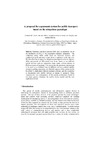Identificador persistente para citar o vincular este elemento:
https://accedacris.ulpgc.es/jspui/handle/10553/43576
| Título: | A proposal for a payment system for public transport based on the ubiquitous paradigm | Autores/as: | García, Carmelo R. Pérez, Ricardo Caraballo, Joaquín Alayón, Francisco Padrón, Gabino |
Clasificación UNESCO: | 120304 Inteligencia artificial 3327 Tecnología de los sistemas de transporte |
Palabras clave: | Industry Smart cards Social aspects Ubiquitous computing |
Fecha de publicación: | 2006 | Publicación seriada: | CEUR Workshop Proceedings | Conferencia: | 1st International Conference on Ubiquitous Computing: Applications, Technology and Social Issues, ICUC 2006 | Resumen: | Automatic payment systems (APS) play an important role in the productive activity of the passengers transport companies. The companies using APSs profit from an improved security and commercial speed and their clients from a reduction in the trip cost. We describe how to apply the ubiquitous paradigm in order to improve APSs and present an APS model that allow clients to use different mobile devices such as contactless smart cards, cellular phones or PDAs as means of payment. The system has the necessary mechanisms to be used in a combined way in different services contexts (public transport, parking, museums, etc). Suitable aspects of the system are the flexibility to implement different payment schemes, and the scalability to incorporate new mobile devices as means of payment. These characteristics are consequences of the system architecture, based on two main generic elements: the mobile device model and the user application model. | URI: | https://accedacris.ulpgc.es/handle/10553/43576 | ISSN: | 1613-0073 | Fuente: | CEUR Workshop Proceedings[ISSN 1613-0073],v. 208 |
| Colección: | Actas de congresos |
Visitas
46
actualizado el 10-ene-2026
Descargas
31
actualizado el 10-ene-2026
Google ScholarTM
Verifica
Comparte
Exporta metadatos
Los elementos en ULPGC accedaCRIS están protegidos por derechos de autor con todos los derechos reservados, a menos que se indique lo contrario.
